Mr. Everything: Christian McCaffrey is the nation's best player, but he can't be summed up by his achievements
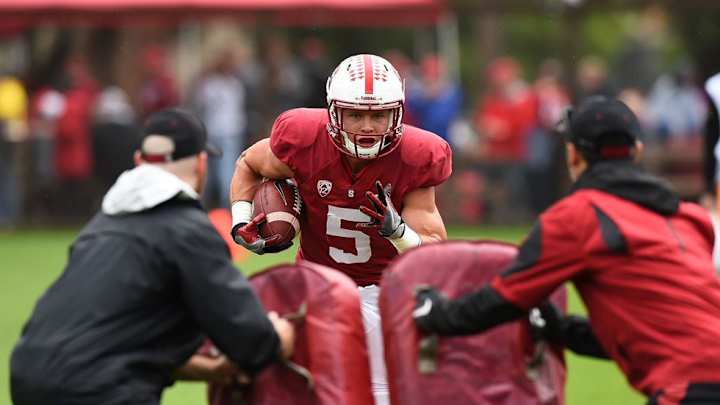
[video: 13724893]
This story appears in the May 16, 2016, issue of Sports Illustrated. Subscribe to the magazine here.
On a recent afternoon in Palo Alto, Calif., Christian McCaffrey—son of Ed and Lisa, nephew of Billy, brother of Max, Dylan and Luke, and the best college football player in America not deemed the Best College Football Player in America—arrived at his Stanford dorm, which is bordered by flowering dogwoods and is just down a path from the university's meditation retreat. He had with him a very large chair.
Normally at this time of day McCaffrey would be at practice, an activity he relishes. He takes every snap to the end zone, regardless of the drill, operating without "a governor," as running backs coach Lance Taylor puts it. Last winter McCaffrey went undefeated in the 6 a.m. training competitions, from the obstacle course to the 10-yard fight. Strength coach Shannon Turley tries to break all prized recruits over the course of their first year with a series of grueling tests, including a VersaClimber death march. McCaffrey was the first player Turley couldn't rattle. "He basically had a Navy SEAL sniper response," the coach says. Turley now designs a special workout just for him.
This was a rare off day before the start of spring practice, so McCaffrey decided to go to the locker room and clear out his swag from the Rose Bowl, a 45–16 victory over Iowa. In that game McCaffrey accounted for 368 yards, a fitting capstone to a season in which, as a true sophomore, he gained 3,864 all-purpose yards, breaking the NCAA mark of Barry Sanders, whose posters adorned his childhood wall. Because McCaffrey is a perfectionist, however, when he came out in the fourth quarter after a seven-yard reception, he was pissed because he hadn't slipped one last tackle. Cardinal coach David Shaw wrapped an arm around him. "You just broke two Rose Bowl records," Shaw said. "You're going to stand here and enjoy it."
In pads and a helmet, McCaffrey is a bulky blur. In person, he's surprisingly short and top-heavy, as if the torso of a larger man were grafted onto a smaller man's body. At six feet and 195 pounds he looks more like a wrestler than a sprinter, provided the wrestler were in a boy band. With blue eyes, a cresting wave of blond hair and a square jaw, he does not lack for female admirers. Nor does he lack for attention, and fans are quick to project upon him. Because he is a relatively small, white running back, he represents all small white guys. Because he has been underestimated throughout his life—assumed to be the kicker at football camps—he represents underdogs everywhere. Because he is an Academic All-America at Stanford, he carries the flag for smart kids. Throw in his Christian faith and his stoic, almost military bearing, and he's what Middle America might conjure were it to create the perfect Running Back Action Hero, a noble young man who could win the Rose Bowl by day and infiltrate enemy camps at night.
For now, though, McCaffrey is just a 19-year-old who shares a dorm room with quarterback Keller Chryst and linebacker Joey Alfieri. The room is dark and small and a bit grungy, more befitting a freshman than the best college football player in America. (Which, again, McCaffrey technically was not in 2015; that was Heisman Trophy winner Derrick Henry, the Alabama running back beside whom McCaffrey stood at the ceremony in New York City in December, smiling but burning inside because the choice felt like an affront to him and his team.)
This being Stanford—where the kid down the hall probably just launched a billion-dollar app or sequenced a genome—football players get no special accommodations. Three raised beds stand on an old brown carpet. McCaffrey's is against the far wall, under a Breaking Bad poster and next to a Game Ready icer. (McCaffrey pretends he is impervious to physical ailments, but coaches say his success is due in part to commitment to recovery, in particular icing and sleep.) Underneath the bed is a brown plastic bin of clothes he will ship home to his two younger brothers, because the McCaffrey family is big on hand-me-downs. Nearby, neatly organized on a nightstand, are a photo album from high school, including shots from a trip to Rwanda; a personalized leather study Bible, which McCaffrey uses in posting quotes on Twitter; and an electric wax melter for diffusing scents into the room. (He also has a large collection of scented soaps.) Conspicuously, however, there is no space for the black leather recliner that McCaffrey chose as his commemorative Rose Bowl gift and has just lugged through the dorm. The chair was part of the three roommates' plan to furnish an off-campus apartment next year, primarily via swag. But storage, it's evident, is going to be a problem.
And for the moment let's freeze McCaffrey here: a young man in a T-shirt and shorts trying to wedge his free chair between two beds. Six months from now he'll likely be everywhere in the sports media, the leader of a top-10 team and the Heisman favorite. A year later, or maybe two, he'll be in the NFL. With each passing day he will mean more things, good and bad, to more people, whether he likes it or not. The clock ticks on his normality.
Then again, given his lineage and background, perhaps he never was normal. In some respects he is like Todd Marinovich, only raised right: a boy seemingly born and groomed to play football. His family is both blessed and haunted by its roots, and to this point his life has been shaped by the many choices, large and small, made by his parents.
Which means that to understand Christian McCaffrey—who he is, where he's headed and what, if anything, he represents—you have to leave Palo Alto and head east, to the exurbs of Denver, where a brown-haired woman with a soccer player's stamina and a barmaid's laugh is, as usual, in a hurry.
*****
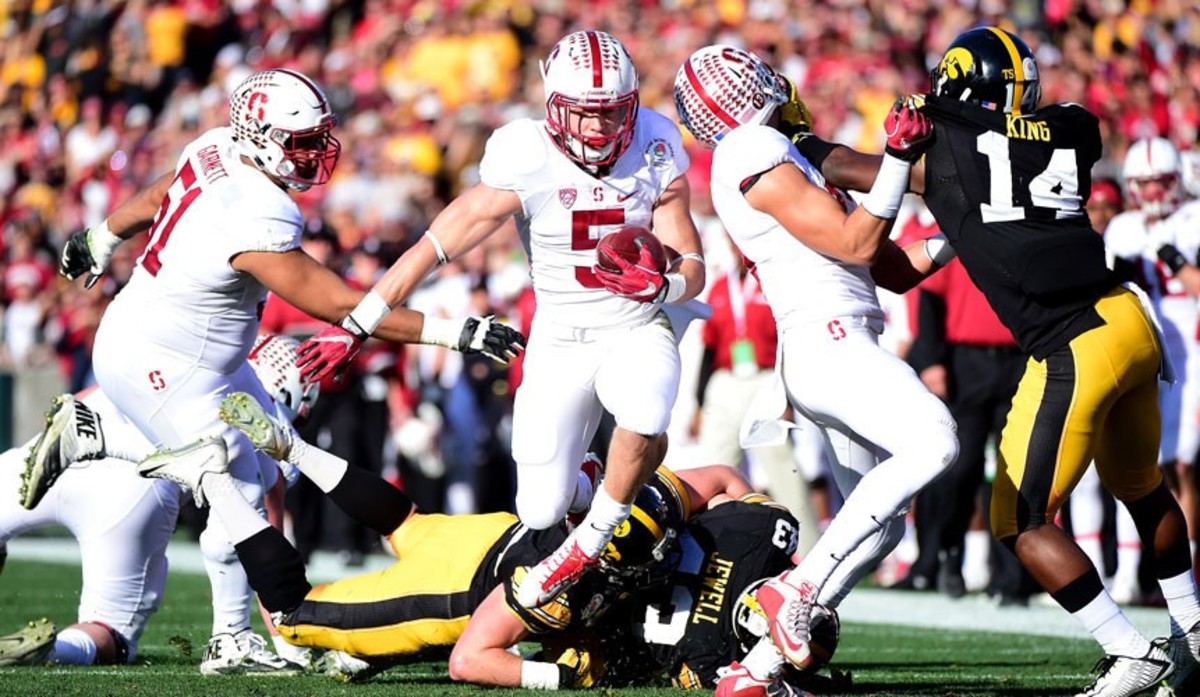
Harry How/Getty Images
Lisa McCaffrey adopted a mantra years ago: Count to four. She still does it, out of habit, to account for all boys at all times: Max, Christian, Dylan, Luke.
On this February afternoon it's Dylan, her third child and a high school junior, about whom she's fretting. He has a basketball scrimmage that Lisa thought she would skip. But then she heard other parents were going, and she started to feel guilty. So now, at 4:30, Lisa's weaving her white Jeep Wrangler north on I-25, following directions on her iPhone while listening to her husband's radio show on AM 760.
This is pretty much status quo for the McCaffreys: heading somewhere to watch a game. Last year Lisa, 47, who has green eyes and an arid wit, and Ed, also 47, a rangy former Pro Bowl receiver for the Broncos, traveled 25 weekends in a row to watch their sons compete. They took red-eyes to Durham, N.C., to watch Max, 21, a senior receiver at Duke; flew to the West Coast to see Christian; and road-tripped to catch the multitudinous Valor High Christian games of Dylan, the 17-year-old starting quarterback, and Luke, 15, his freshman backup. (Complicating matters, Ed also does color on Broncos games, while Lisa has a fear of flying.) The McCaffrey boys have played year-round sports their whole lives, and rarely has any of them competed without at least one parent present.
On this afternoon, while Lisa watches Dylan, Ed makes sure Luke has a ride home from basketball practice. Once, some years ago, the family left one of Max's basketball games in two cars. Halfway home Lisa called Ed to talk about dinner. When she asked what Luke, then five, wanted, Ed responded, "Isn't he with you?" Both cars made immediate U-turns. Says Lisa, "When we returned, Luke was outside the gym, with a hat on, sitting with this really nice Mexican family who didn't speak a lick of English, eating birthday cake while someone was hitting a piñata." She pauses. "Is that a social services situation? Ha-ha!"
It wasn't supposed to be this complicated. Two kids, a boy and a girl, that was the original plan. When Lisa got pregnant a second time, she informed Ed by wrapping a pair of tiny pink slippers in a box. ("Poor Christian," she says. "When I found out he was a boy, I cried.") So they tried again, then again. Boys kept emerging, which may explain why the McCaffrey house now contains what is, in essence, a woman cave on the lowest level, a room bursting with sculptures and art, including a painting table where every guest is expected to fashion a small self-portrait to be hung on the wall.
STAPLES: Proposing a radical college football conference realignment plan
Ed chalks up his children's gender to their mother's genetics. Lisa has a different theory. She thinks men who use cold tubs, as Ed does, produce boys, while hot-tubbers produce girls. As with many of her comments, it's hard to tell how serious she is.
Ed is easier to read: earnest and goofy, if a bit wary. He and Lisa met at Stanford. Ed was a good receiver with a bad mullet. She was a soccer star whose high school exploits had landed her in SI's "Faces in the Crowd." On their second date she lied and said she knew how to cut hair; a nearly two-hour mullet-shearing exercise ensued in Ed's off-campus apartment. In 1991, when the Giants drafted Ed in the third round, the couple moved to New York. They were married the next year.
Three seasons in, the Giants cut Ed. At 6' 5" and 215 pounds he was a fearless competitor and excellent blocker, but he looked bigger and stiffer than most wideouts and was sensitive about the perception that he was slow. Determined to be as light as possible, he dieted obsessively and rid himself of six pounds of equipment. He played without a belt buckle, stripped the lining and pockets from his pants and wore flimsy pads better suited to a junior high player. Whether any of this actually made him faster was unclear; what mattered was that he felt faster.
After a season with the 49ers he stuck with Denver and became a favorite target of John Elway's. In 1998, Ed made the Pro Bowl. When the Broncos won their second straight Super Bowl that season, Christian, then two years old, appeared in SI the first time, running amid the confetti. (He keeps the photo on his iPhone.)
In 2001, when Luke was born, the McCaffreys bought a four-bedroom house on a golf course in the wooded hills of Castle Rock, 45 minutes south of Denver. To the dismay of the course's owners, the boys sprinted onto the fairways after hours, playing tag and Oklahoma and throwing deep fades until the grass was torn up. Each boy has a distinct personality. Max is the cerebral one, Dylan the introvert, Luke the mediator and Christian—well, Christian was always different. For starters he looks like no one in his family. Nor did he inherit his father's skepticism or his mother's penchant for worrying. "Happy from the day he was born," says Lisa. "No matter what he does—toll-booth collector, barber, zookeeper—he'll be happy. With a side of competitiveness."
Indeed, all the boys competed, but none like Christian. When Max began playing football at nine, Christian insisted on doing so too, even though he was only seven. He had an uncanny ability to replicate athletic maneuvers, watching dunks on TV then imitating them almost perfectly on the driveway minihoop, mimicking the moves of Sanders and Reggie Bush.
But it was his speed that was the most obvious outlier. In his first youth football game he scored half a dozen touchdowns, primarily by outrunning everyone. For years Ed was mocked by teammates and opponents alike for being slow and pale. But here was genetic proof of his swiftness, passed down from him and Lisa, who was a blur at forward before back problems ended her soccer career. They were understandably proud.
"That's why Ed and I got together," Lisa cracked in a story in this magazine. "So we could breed fast white guys."
*****
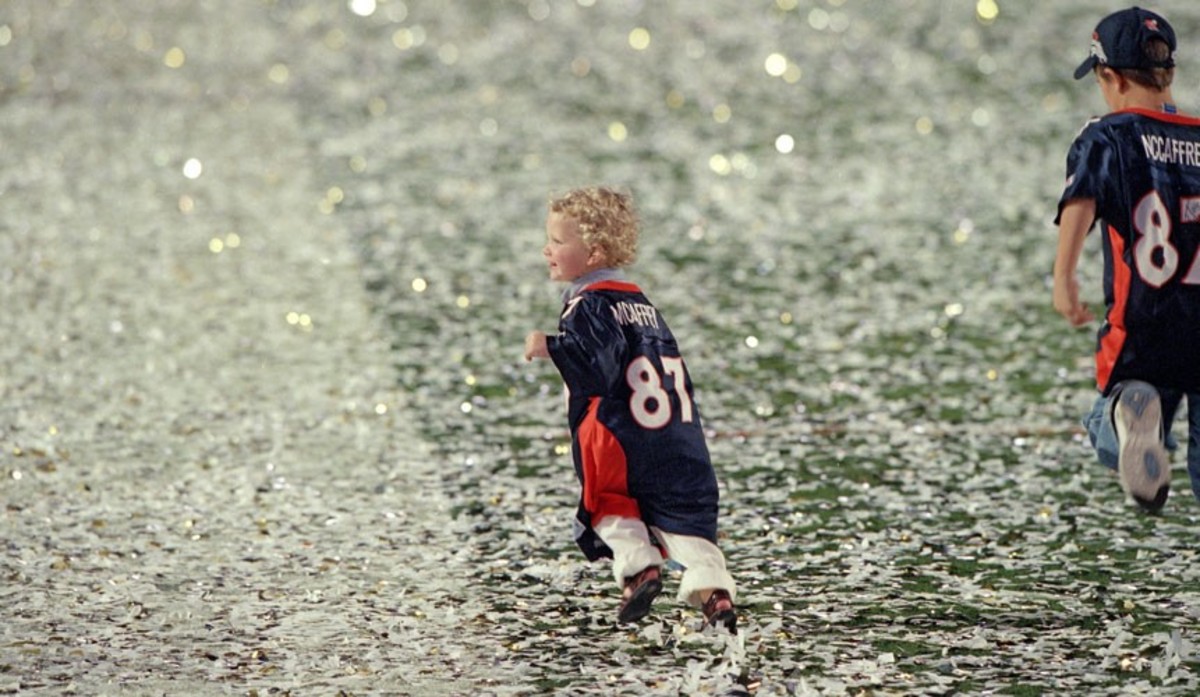
Robert Beck
Which brings us to the famous family tree. Ed grew up in blue-collar Allentown, Pa., where a succession of McCaffreys became legends at Central Catholic High. Visit the school today and you'll see them up on the gym wall: Ed, the oldest of five, a Parade All-America in football and basketball; Monica, who set the school scoring record in basketball and later played at Georgetown; and Billy, who broke Ed's hoops scoring records, won an NCAA title at Duke and was an All-America guard after transferring to Vanderbilt. Even now, old men on bar stools in Allentown tell stories about the year Billy Mac came off the bench as a freshman to help Eddie win a state title.
The Olympian of the family is on Lisa's side, though. In 1956 her father, David Sime, was dubbed the World's Fastest Human—and landed on the cover of this magazine—after breaking or tying nine world records in the sprints and low hurdles. A groin injury kept him out of the Olympics that year, but in 1960 he took silver in the 100 in a photo finish. Sime led a fascinating life: He passed up careers in baseball and football; became a renowned ophthalmologist in Miami whose patients included Richard Nixon, Mickey Mantle and Ted Williams; battled eye, liver and lung cancer; and was elected to the National Track and Field Hall of Fame. His children excelled in sports: Sherrie was a top-ranked tennis player at Virginia, Scott a fullback at Duke.
The Sime-McCaffrey bloodline is formidable, yet the McCaffreys don't like to discuss it. The only condition Christian put on interviews for this story was, "No extended-family questions." Both Ed and Lisa bristle when the topic of family is raised in relation to Christian's success, especially by the media. "It seemed like they were trying to find reasons for why Christian is good, so they were bringing in other family members, some of whom had nothing to do with his upbringing," says Ed. "No disrespect to any relatives, but they've never even watched [Christian] play a game [in person], and all of a sudden they're a part of the family tree? My brother was a great athlete but didn't even play football. It almost cheapens what Christian's accomplished to try to give credit to other people."
On Ed's side the family drifted apart. He went west for college and stayed. It's been 20 years since he brought the family to Allentown. Meanwhile, the Simes were based in Miami, and while Lisa remained close to her mother, Betty, she seldom heard from her father after her parents divorced in 1997. David passed away in January.
"I could write a book on my family," Lisa says while driving back from Dylan's scrimmage. She laughs nervously. "I had an awful dad. He didn't even know my younger kids' names. He never once came to one of my kids' sporting events. He was abusive, alcoholic, a womanizer, cheated on my mom for 38 years. Hit me several times in the face. Just not a very good person."
She pauses. "All of a sudden Christian's name is in the paper, and the next thing you know my dad's doing interviews. You ever see The Waterboy? Remember the end, where the dad comes in, says, 'We could be like Tiger Woods and his daddy!' Ed and I saw that over Christmas, and we were like, There's Dave!" She looks up. "One reporter wrote, 'Dave's genes are coursing through Christian's veins.' If Christian is one ounce like my dad, I feel like I failed as his mom. My goal is to make sure none of my kids are anything like my dad." (Betty, who remarried in 2000 and lives in Key Biscayne, Fla., confirms her daughter's account.)
Lisa pulls up to the house just after 6 p.m. Ed is bent over the oven in a T-shirt and jeans, appraising five steaks. Luke sits at the kitchen counter, eating a burrito. Presently Dylan, 6' 5" and 200 pounds, comes down in a Johnny Cash T-shirt. He looks like his dad—lanky and dark-haired. Earlier in the week he committed to Michigan, to play under Jim Harbaugh in 2017. Everyone agrees it's a great fit, though Lisa worries a bit about the size of the school. (Left unspoken is that Dylan was a finalist at Stanford, but the Cardinal went with a different QB.)
As dinner is served, the topic of parenting arises. The McCaffrey method is based on trust and discipline. On one hand the parents leave Luke and Dylan at home when they travel. On the other they didn't allow the boys to have their own phones until the eighth grade. Sleep is a particular preoccupation. At Stanford, Ed took a psych course called Sleep and Dreams. Ever since, he has been fixated on the importance of rest. Sleepovers were discouraged. ("I don't know why they call them a sleepover," says Ed. "No one ever sleeps.") The boys aren't allowed to stay up late, even to finish homework. No screens in bed. No phones after 10 p.m.
Now Lisa turns to Dylan, and the family's usual repartee begins: "We were just talking about the rule about your phone. You love that rule, right?"
Dylan, sarcastic: "I'm not going to have self-discipline when I'm older, and I'll just be on it all night. I'm going to be like, Whoa, a phone! At night! I've never had this before!"
Lisa, giggling: "I can't stop!"
Dylan: "I'll never be able to turn it off."
Ed, the voice of reason: "At that point, though, we will have done our jobs."
Dylan: "How's that?"
Ed: "We will have provided love and discipline throughout your youth, and then when you're an adult, you'll be able to make your own decisions."
Dylan, after a pause: "It's the whole affluenza-teen-type deal."
Ed, looking up from his steak: "The what?"
Dylan: "The dude kind of got everything he wanted [a reference to a recent nationally publicized manslaughter trial]. Then he kind of flipped and killed people in a drunk-driving accident, and [his] lawyers made an argument that basically he didn't know any better, he was a spoiled brat. It'll be the opposite of that for us. We grew up so restricted that when we get older, we're finally on our own—"
Lisa, interrupting: "Dylan, I'm just telling you now, you're welcome. For the future. You're welcome."
And on it goes. The jokes mask what appears to be mutual respect. If the boys are dealing with teenage angst, or rebellion, they're hiding it well. "I used to get so upset when my parents took away my phone," says Christian, "and then I realized it's because they wanted the best for me and my brothers. I have a whole new appreciation for how they raised us."
Like Max, Christian grew up in his family's shadow (just as today opponents chant Der-rick! Hen-ry! during Dylan's basketball games). Lisa tells the story of how, as a ninth-grader, Christian was tackled and ended up on the opposing sideline. "A coach gets in Christian's face and says, 'You're a p----, just like your dad!' And Christian goes, 'I'm 14 years old!'" She laughs. "It was the perfect comeback."
Ed found it less humorous. He considered moving the family out of state. Then he looked for a local high school that could provide a safe harbor. In 2009 he found one.
*****

Al Goldis/AP
You would be forgiven, upon walking onto the sprawling Valor High Christian campus, for thinking you are at a small college. Founded nine years ago as a private, faith-based school, Valor sits on 35 acres in Highlands Ranch, south of Denver, and features grand academic buildings, an expansive library, multiple gyms and a state-of-the-art football field with synthetic turf. The school, whose tuition is $17,300, attracts kids from 30 zip codes, and 67% of its football players go on to play in college. Near-life-sized posters of former and current school stars line the halls—there's Christian and Max and Dylan.
Max was the first McCaffrey to attend, transferring as a sophomore in 2009. At the time, Valor was not yet a sports powerhouse. Then the son of Jack Del Rio, who was the Broncos defensive coordinator, enrolled to play QB; more McCaffreys arrived; and the football team rose from 3A to 5A while winning five consecutive state titles, one by a score of 66–10.
Rod Sherman is the coach. His first words regarding the McCaffreys are: "God has really blessed us." The latest, Luke, is already on the radar of major colleges. It is not inconceivable that all four brothers will end up in the NFL at the same time, a skinnier, less meat-heady version of the Gronkowski clan. (A few weeks ago Max became the first, signing as a free agent with the Raiders after going undrafted this spring.) Sherman's one complaint: "I told Ed and Lisa once, The only problem is you didn't procreate more!"
Christian seldom got more than 20 carries and at times sat out the second half, but according to Sherman he never once complained. When the team voted on captains before Christian's senior season, the coach says, "pretty much everybody had Christian first." But Christian said, "We don't need captains, we're all in this together," so they were all co-captains. Says Sherman, "He has the ability to make himself less to make others great."
In four seasons Christian scored 141 touchdowns and averaged 9.8 yards per carry while breaking a host of state records and posting a 3.65 GPA. Duke, Ohio State, Oregon and UCLA made offers, but they saw Christian as an athlete, not a running back. He chose Stanford, which wanted him to take handoffs and graduates 99% of its football players.
Still, Sherman worries. "I pray for Christian all the time," he says. "Because he's had so much success, he hasn't had to handle a lot of failure."
*****
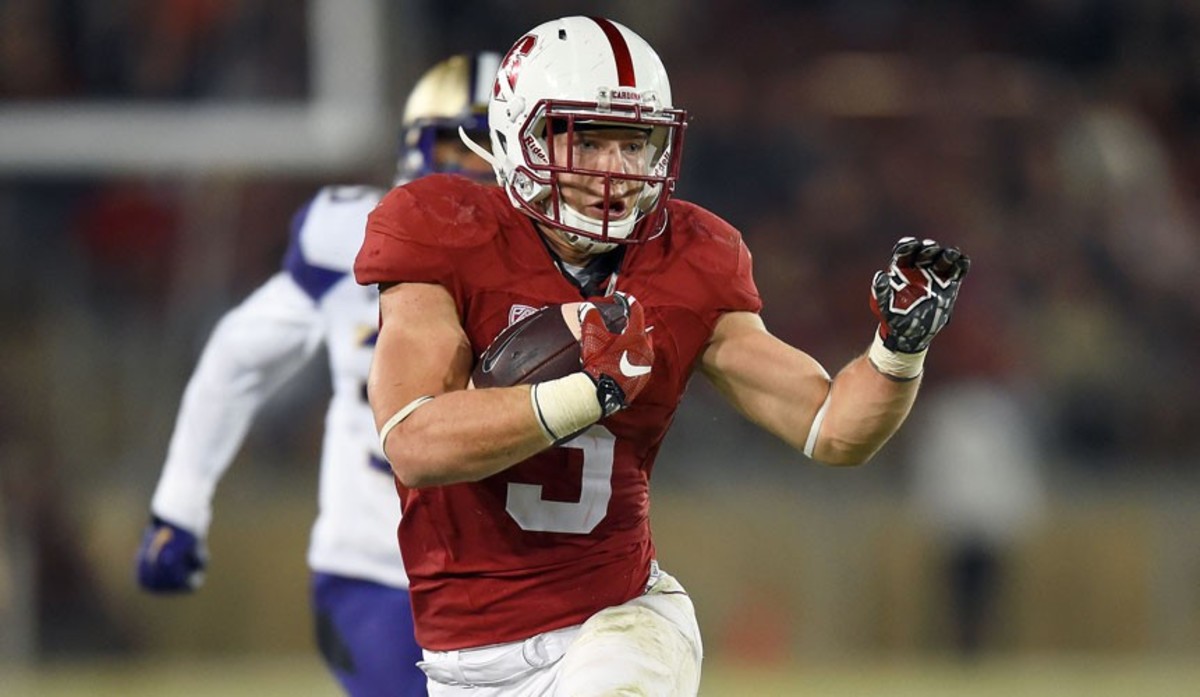
Thearon W. Henderson/Getty Images
Failure? Failure can be explained, according to Christian. "The secret behind success isn't as much of a secret as people think," he says with the certainty 19-year-olds regularly muster. "It's pretty simple. It's working as hard as you can to accomplish what you want."
He is sitting outside the Arbuckle Dining Pavilion on a sunny afternoon the same week as his recliner reclamation adventure. Athletes glide by on hoverboards. Students curl up with laptops in Adirondack chairs. McCaffrey says he likes to eavesdrop on conversations here because "whatever they're working on or talking about, you can tell they care about it." He is in awe of the "next Mark Zuckerbergs" in his midst.
Here in the Stanford bubble McCaffrey can be anonymous. He can eat at Jimmy V's sports café (tilapia or chicken breast with avocado), and no one bothers him. At night he and Chryst and Alfieri go out to eat in Palo Alto—maybe at the Creamery or MP Mongolian BBQ—then watch TV and crack jokes, like other college kids. Stanford is a place to hide in plain sight. And for Christian, losing this privacy may be the biggest challenge in the year to come. Though affable, he doesn't like to talk about himself. He values his time. The Stanford communications staff worries he may not be prepared for the coming onslaught.
Last season, after Shaw had limited his touches as a freshman—a matter of small contention among Cardinal fans—McCaffrey crept into the spotlight. Offensive coordinator Mike Bloomgren developed a pin-and-pull scheme, similar to what Chip Kelly ran with the Eagles, and McCaffrey studied tape of running back LeSean McCoy, in particular his patience waiting on blockers. McCaffrey occasionally texted Taylor late at night to break down plays. He rushed for 66 yards the first game, then 58, and then the dam broke: 115 yards, 206, 156, 243. He returned kickoffs and punts, handled play-actions, threw passes and lined up as a wildcat QB. He had 369 all-purpose yards against UCLA; 389 against Cal; an unreal 461 in the Pac-12 title game against USC.
Traditionally, Stanford's leader has been a senior or a quarterback. Now, for the first time in memory, a sophomore running back is in charge. "He is a manifestation of everything you preach as a coach," Shaw says. "It makes it easy for me. I just say, 'Do it like him.'" McCaffrey has already won the locker room. Last year he became the first underclassman chosen to carry the flag onto the field for games. He's currently leading voluntary spring workouts.
McCaffrey embraces the Stanford mentality. The locker room bears slogans such as GREATNESS IS THE RESULT OF REPEATED INTENTIONAL ACTIONS and HOME OF INTELLECTUAL BRUTALITY. He walks through, pointing out a screen with drill times and the schedule for body-fat testing, and noting the wall murals of Cardinal All-Americas and alumni in the NFL. He talks about "playing pissed off" because "people think we're cushy or just nerds" and about becoming "a new being" when he walks onto the field. "It's about finding that animal inside of you, finding that beast that can go 60 minutes of fast, physical football."
STAPLES: Can Larry Scott solve the Pac-12's problems and boost revenue?
The coaches' goal for next season is to preserve McCaffrey. Bloomgren aims for 20 to 24 carries a game. No longer can McCaffrey return every kick or be a gunner. ("But what a gunner he was," says special teams coach Pete Alamar, wistfully.) According to Turley, McCaffrey has increased his vertical by two inches and his bench press by 30 pounds while reducing his body fat 3.6%. It is quite a challenge, after all, to improve on a record-breaking season.
For now McCaffrey is focused on the little things. He is in the same Sleep and Dreams course Ed took, taught by the same professor, and has become equally obsessive about rest. He also has an introspective side. A few months ago he posted a screenshot note on Twitter. It read, "My advice to the younger generation ... Enjoy the authenticity of this world. Read a book, ride your bike, go to the park, play in the backyard, or build a fort. Do something with your friends that will spur your imagination. ... Put the phones down!" He took some grief because, of course, he made the post from a phone (which was at 9% battery). But the message was retweeted more than 5,000 times. He could be an honorary cranky old person.
His tone changes, however, when it comes to concussions, about which he claims not to worry. "We know what we sign up for," he says, sitting outside Arbuckle. "I couldn't imagine not playing." He pauses. "I know it's a risk, but life's worth taking risks and doing what you love."
He has a natural ability to champion a cause, and some hope he'll take his faith more mainstream, like Tim Tebow, whom McCaffrey met in December. ("An extremely great guy," he says.) To date, though, McCaffrey has been more reserved. "I don't like being in people's face about it, because that's just not who I am," he says. His skin color is the more discussed topic, anyway. He's the answer to a "ThingsWhiteFolksLike" post on Twitter. When he won the Jet Award, for the nation's best returner, the first comment on his Facebook page read, "You should have won the Heisman but you're White … " And that's just the beginning. A trip down the Internet rabbit hole provides far darker material.
Ed is irked by the subject, though from a football perspective. He wishes Christian were compared to running backs, not to slot receivers such as Wes Welker. "There are immediate stereotypes about a white running back who grew up in the suburbs of Colorado," Ed says. "When we've gone to camps or all-star games, he walks on the field and people look at him like he's nothing."
Christian tries to brush it off, but it's not easy. "When you read about white athletes these days and white skill possession receivers specifically, one word you'll always find is tough. You'll rarely see explosive, athletic, stuff like that. … You get a little bit upset: 'I ran the same 40 as this guy, and you're calling him ...'" He trails off. "People do the eye test and underestimate me, so I do play with a chip on my shoulder." It is a bizarre thing to consider: a white, upper-middle-class male enrolled at Stanford whose challenge, he feels, is to overcome those very privileges.
It's unclear whether McCaffrey sees the irony. Then again, perhaps that's part of what makes him so successful. We all need something to drive us.
*****
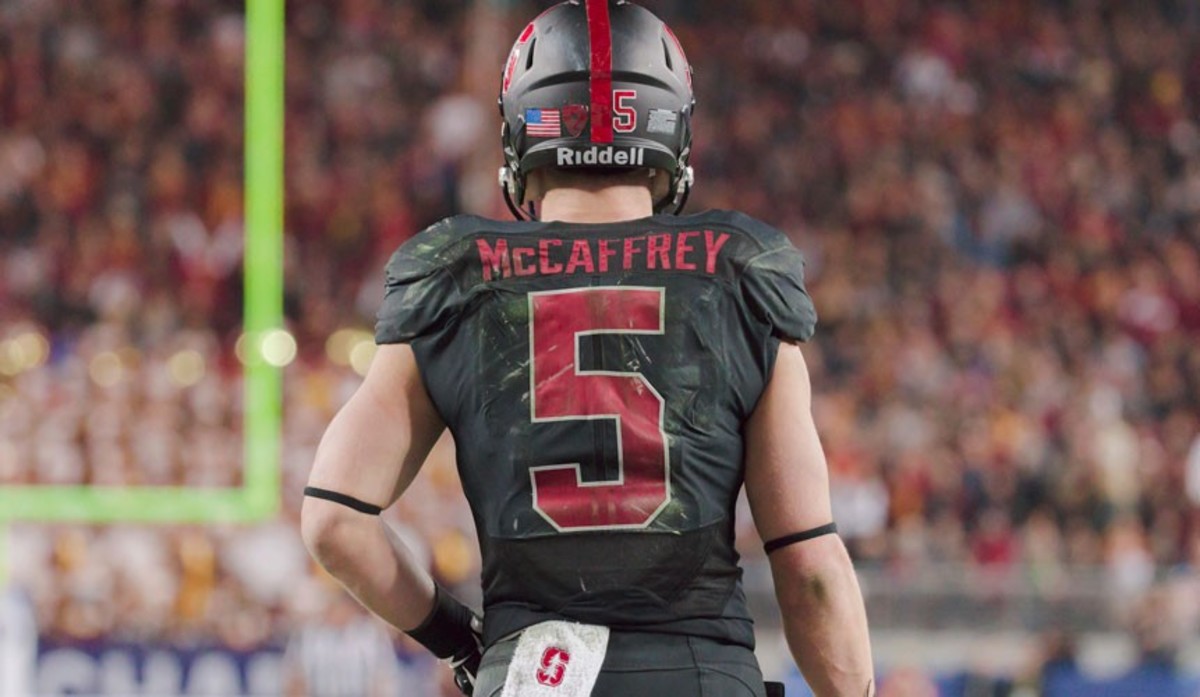
David Madison/Getty Images
It is later that evening, after practice. McCaffrey walks out of the locker room with a backpack that contains headphones, a MacBook and a sub for later that night. He carries his electric rechargeable longboard.
He passes a gym where a ragtag game of pickup basketball plays out. "Man, how great would it be just to play some hoops right now?" he asks. He watches for a moment, caught up in the carefree, almost reckless play. A bunch of college kids screwing around. Maybe they'd go out and drink beer after. Or spend the night playing video games and talking about girls.
McCaffrey shoulders his bag and keeps going. He has physics homework to finish, after all, and sleep to log, and a workout to dominate in the morning. Now is not the time to dawdle.
